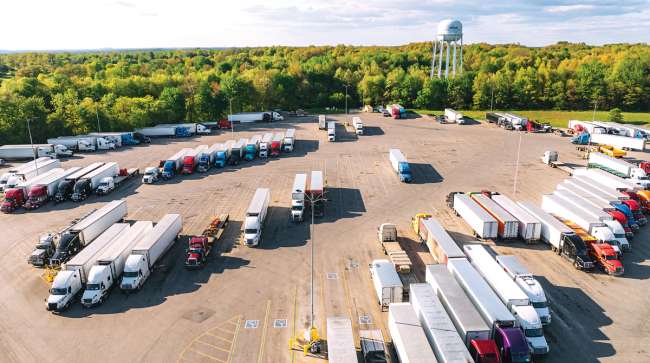Senior Reporter
Truck Parking Apps Face Resistance From Drivers, Study Finds

[Stay on top of transportation news: Get TTNews in your inbox.]
A new federal study examining two interstate corridors has concluded that truck drivers are reluctant to use certain app-based truck parking management platforms that could help mitigate parking shortages and assist drivers in meeting hours-of-service requirements.
The study, which included a pilot to collect data, found that despite parking shortages along Interstate 80 and Interstate 94 corridors in Iowa and Wisconsin, drivers are mostly not using the apps to look for empty parking places, resulting in trucks parking on the entrances, exits and rest areas along the corridors.
The Texas A&M Transportation Institute conducted the study, which was released last month, on behalf of the Federal Motor Carrier Safety Administration.
“The objectives of this research were to analyze the usage of truck parking capacity along the I-80 and I-94 corridors in Mid-America Association of Transportation Officials states; identify when, where, and for how long trucks are stopping in unauthorized locations along the two corridors; and to determine the feasibility and benefits of deploying truck parking capacity management platforms to optimize truck parking capacity usage from a geographical and temporal perspective,” the study said.
“Adequate, safe parking remains a top concern for the trucking industry and for truck drivers, but providing sufficient and free parking in a timely manner is becoming increasingly challenging for both the public and private sectors,” according to the study.
Assessing Truck Parking Capacity Usage - January 2025
Both the Iowa and Wisconsin departments of transportation pointed to the fact that there is not enough funding to expand truck parking to meet current demand — let alone future demand. However, truck parking management platforms such as Parkunload, as demonstrated during the pilot, can provide a low-cost technology option to inform drivers of not only the number of available truck parking spaces, but also where the spaces are in a rest area or truck stop.
RELATED: Truckers Get Real-Time Parking Info on Arizona’s I-10
“The input received from truck drivers at the Pilot rest areas during the implementation of the Parkunload platform was overwhelmingly positive,” the study said. “On the other hand, the input received in response to the social media outreach was overwhelmingly negative.”
The data collected and analyzed during this research study demonstrated unmet demand, especially for overnight parking, resulting in truck drivers parking on the entrances and exits to rest areas along the I-80, I-39, I-90 and I-94 corridors.
Host Seth Clevenger and TT's Connor Wolf discuss CES 2025 and the emerging technologies that could push the trucking industry forward. Tune in above or by going to RoadSigns.ttnews.com.
“The pilot illustrated the technical feasibility of using technology solutions, such as parking capacity management platforms, to provide drivers with ‘more granular’ (digital) information about the availability and location of truck parking spaces,” the study said. “It also demonstrated that the technology can be used to specify a time limit for drivers to park and thereby manage the time that drivers are allowed to park.
“The two biggest challenges associated with app-based truck parking management platforms are driver participation (i.e., reaching drivers and convincing drivers to download the app) and compliance (i.e., convincing drivers to use the app every time when parking to check in and check out).”
The study concluded that assessing the feasibility of truck parking management platforms — from a driver perspective — is complicated by the difficulty in identifying and reaching a representative sample of truck drivers that could indicate how the broader population would respond to these platforms.
While convincing drivers to use a parking capacity management platform remains a “major challenge,” researchers identified potential applications for the technology platforms, including at truck stops, smaller rest areas, safety and weight enforcement facilities where sophisticated truck parking availability systems may be cost-prohibitive.
“In the future, assuming higher adoption of electric trucks, information about where electric charging infrastructure is available would be of benefit to truck drivers,” the study noted.
Want more news? Listen to today's daily briefing below or go here for more info:





